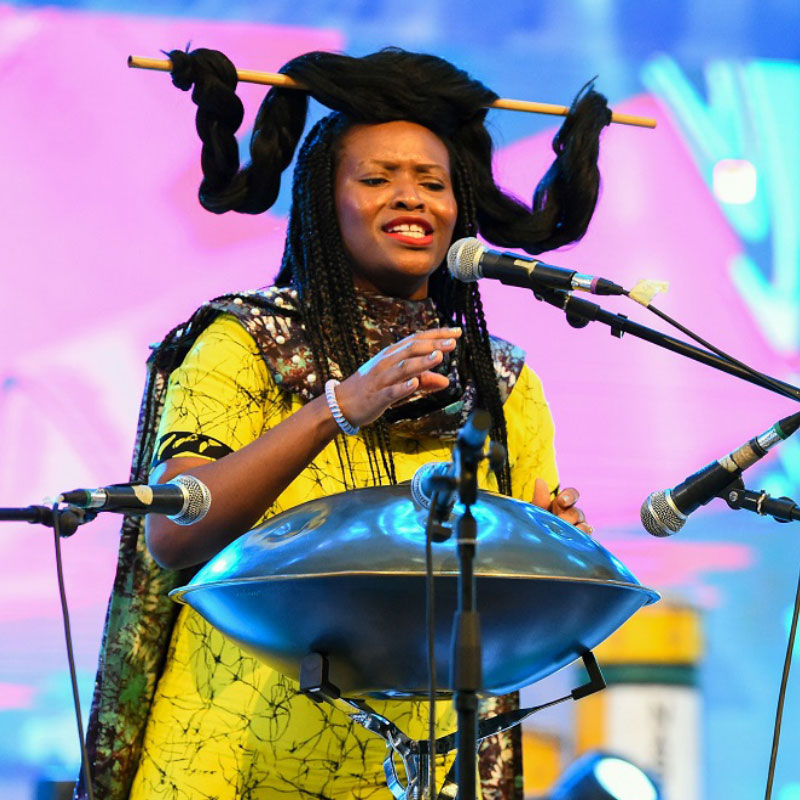
Groundbreaking Pidgin opera mixes music for cultural harmony
The cheering crowd in southwestern Nigeria is thousands strong but when the performer on stage in a yellow catsuit and glittering cape beats out eerie rhythms on a steel drum, they hush.
Then as Helen Epega begins to sing, her powerful voice filling the air at the outdoor auditorium, the crowd roars.
The musical genre may be unusual in this part of the world but people understand it — Epega is singing what she and organisers of the festival in which she is participating say is the world’s first opera in Pidgin.
Nigeria is Africa’s most populous nation, with many ethnic groups and hundreds of languages.
But Nigerian Pidgin — a lingua franca sometimes referred to as “Broken English” — is understood by almost all.
“The reaction has been overwhelming,” said 37-year old Epega, who performs under the stage name The Venus Bushfires and comes from the southern Nigerian city of Benin.
“People are really excited about it,” she told AFP. “Perhaps it is because they feel they haven’t had a voice, or had a chance to express themselves in this way.”
Written by Epega herself, the opera has yet to be staged in its entirety but it will involve several singers and an orchestra.
But she has performed long excerpts with various drums and guitar, in Europe, Cape Town and Lagos, among other places.
And as Epega performed at the recent African Drum Festival in the southwestern city of Abeokuta, the audience danced along, breaking with tradition for an opera.
Titled “Song Queen”, it is about a warrior queen and people who “sing a peaceful reality into the world” through music, she said.
The crowd loved it.
– Bridging cultures ?
The use of Pidgin, which is understood across Nigeria, provides unaccustomed access to opera.
“It is not the music I think of when you talk of African drumming,” said student David Ikeolu at the festival.
“But she is singing our language, and that is special to hear,” he added.
More than just serving as a lingua franca, Pidgin can also help to bring people together, Epega said.
“It shows that it is not only OK to break barriers — in fact, we must,” said the singer, who has also lived in Britain.
“If we are going to have a dialogue about unity and peace and love, we must find ways to build bridges between ourselves.”
– Pidgin power –
Pidgin, which is endlessly changing, was once scorned by some as a language of the street.
But it has a powerful and growing cultural influence across all classes.
The BBC has started a Pidgin radio and news website, stand-up comedians are entertaining packed audiences and novels are being written in the language, noted Nigerian author Richard Ali.
He said he had recently helped translate an 11th-century Arabic story of Al-Hariri of Basra into Pidgin.
“Adaptable, jazz-like and subversive,” the writer said of Pidgin in a recent article.
Ali also praised Pidgin as a bridge-building tongue that enables even rival groups who cannot understand each other to speak to one another and laugh, turning “competitors into comrades”.
– ‘Afro-futuristic’ –
With her hair in long tresses dramatically looped up in curls around a horizontal baton, Epega beats out rhythms on a “Hang”, a Swiss-made percussion instrument.
Two steel shells, one upon the other, resonate when she taps the Hang with her palms, creating a ghostly sound like that produced by Caribbean steel pan drums.
Like Nigeria’s forever changing Afro-pop music, Epega’s sound fuses very different musical styles together for something she describes as “Afro-futuristic”.
It is a mix of old and new, bringing together “a blend of the rich African tradition of storytelling, using Nigerian Pidgin English, with Western classical opera,” she said.
Epega’s inspirations — from Nigeria’s late Afro-beat icon Fela Kuti to British singer Kate Bush and Mozart — reflect her upbringing in both Nigeria and Britain.
“I think I’m finding a way to marry them all together,” she said, grinning.
– Unity in diversity –
Celebrating the strength of unity in diversity was another key theme of the festival.
Wole Soyinka, the 1986 winner of the Nobel Prize for Literature who comes from Abeokuta, acted as an advisor to its organisers.
“When you watch a performance of drumming, you are listening to poetry too,” Soyinka said, addressing the opening ceremony.
“If you listen to a recital, it is all about rhythm.”
For Epega, mixing the beat of traditional drums with the sounds and rhythms of modern instruments conveys a powerful message about inclusion.
“I’m saying that no matter where you’re coming from, and where you are on the musical, cultural and social spectrum, I believe we all meet when we speak the same language,” she said: “Music”.




